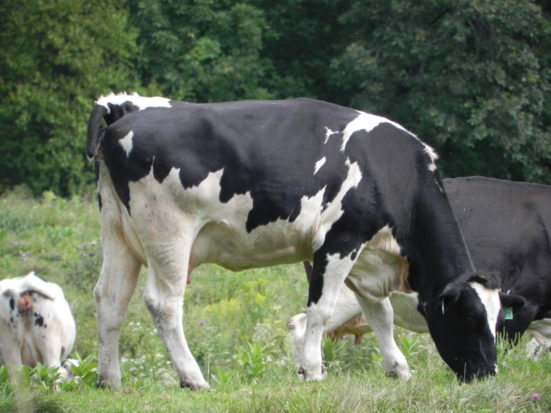The “organic” market is one of the fastest-growing sectors of the food industry – generating more than $40 billion in sales last year alone. But increasingly, consumers want to know that the U.S. Department of Agriculture’s National Organic Program has integrity and meaning and that producers invoking the federal government’s label are honoring the standards.
Yesterday, Washington Post reporter Peter Whoriskey broke a major investigation into a large organic milk producer in Colorado that appears to be skirting the rules on organics – in other words, a factory farming operation masquerading as an organic family farm. Whoriskey visited the complex in Colorado, with more than 15,000 cows and supplying Walmart, Costco, and other major retailers, and found it openly flouting requirements for grazing cows that must be primarily grass-fed. That’s not just a case of deceiving major grocers but also consumers who pay a premium for a product that’s not what it appears to be.
Under current USDA regulations, cows in organic farms are required to have access to pasture. Factory farms like the Aurora Organic Dairy, profiled in Whoriskey’s piece, also cheat legitimate organic farms, which comply with the letter and the spirit of the organic statute and regulations, and deny them business. These legitimate farms allow their animals to go outdoors, just like the pictures on the cartons indicate.

The new federal organics rule covers a whole array of housing, husbandry, and management topics, including the prohibition of certain painful practices, like tail docking of pigs and cattle and debeaking of birds. Photo by Mary Beth Sweetland/The HSUS
Not only do we need more vigorous enforcement of existing organic standards, but we also need fortified organic standards – standards that really mean something when it comes to animal welfare.
Fortunately, there’s a new standard about to be implemented, as long as Congress and the new leadership at the USDA don’t attempt to delay or dismantle it. There was an effort to include language to weaken the standard in the massive spending bill that the House approved today (and the Senate is set to approve later in the week), but our allies in Congress, led by Sen. Pat Leahy of Vermont, were able to stymie that effort. The new rule is now set to go into effect on May 19th, although there are conventional agribusiness interests plotting efforts to attach weakening language on other legislative vehicles.
The new rule covers a whole array of housing, husbandry, and management topics, including the prohibition of certain painful practices, like tail docking of pigs and cattle and debeaking of birds. Importantly, the rule sets minimum indoor and outdoor space requirements for egg-laying chickens, and requires that producers provide a sufficient number of exits and outdoor enrichment to entice birds to go outside on a daily basis. It also specifies that covered porches and similar structures do not qualify as outdoor space. While existing organic poultry operations have five years to come into compliance with outdoor access requirements for birds, the minimums for indoor space and all other welfare standards in the proposed rule will come into effect one year after the rule becomes effective.
This new organic standard, in the works for more than a decade and the product of input from farmers all around the nation, demonstrates the changing social consensus on animals among consumers increasingly concerned about farm animal welfare. A 2015 Consumer Reports survey found that more than 70 percent of Americans believe there should be meaningful minimum-size living space requirements for farm animals raised under the organic label, and that the animals should have access to the outdoors, yet the current regulations do not guarantee these basic protections for organically raised animals. Another Consumer Reports survey last month showed that more than 80 percent of Americans support the standards enshrined in the new rule. And yesterday, nearly 350 organic farmers wrote to lawmakers and urged them to stick with the rule, arguing that a meaningful organic standard allows them to appeal to consumers with an interest in stronger production standards and who are willing to pay more. That means more money for farmers on the ground, allowing more family farmers to stay in business.
The new organic animal welfare rule has the support of The HSUS, and of major organic companies and trade groups, including Egg Innovations, Organic Valley, Perdue Farms, and the Organic Trade Association, as well as consumer groups like Consumers Union and the Center for Food Safety. Efforts by the Trump administration to delay implementation of the Organic Livestock and Poultry Practices rule would amount to an attack on animals, consumers, and family farmers who depend on a meaningful standard.
The post Organic standards under attack in the field and in Washington, D.C. appeared first on A Humane Nation.
Enviroshop is maintained by dedicated NetSys Interactive Inc. owners & employees who generously contribute their time to maintenance & editing, web design, custom programming, & website hosting for Enviroshop.
